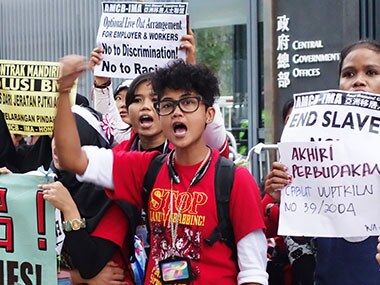By Anne-Sophie Galli/DPA Hong Kong: Erwiana Sulistyaningsih only wanted to do what tens of thousands of other Indonesians do: support her family at home by working as a housemaid for the wealthy in Hong Kong. Maids’ remittances pay down their parents’ debts, cover their children’s school fees, or accumulate capital to later open up their own businesses or buy a house. It didn’t work out that way for Erwiana, who was 22 when she arrived in the city. Instead, eight months later she found herself in a hospital bed, hardly able to walk, after her employer beat and starved her, while making her work for up to 21 hours a day. Her case made international headlines two years ago when it came to light, with thousands demonstrating on the streets and demanding “Justice for Erwiana.” Last year her employer was sentenced to six years in jail and fined around 1,850 dollars. It wasn’t enough, said Erwiana. “It seems that while we recognize maltreatment of migrant workers as bad, and (know) that slavery exists in Hong Kong, the Hong Kong government seems to tolerate it,” she said outside the court. Rights organizations say food deprivation, 17-hour working days, unpaid wages, beatings and even rape are just some of the dangers that migrant workers — mostly women — face in Hong Kong. And it’s not just employers, but the authorities too, who put the workers’ safety at risk, according to a report by Amnesty International. Getting a job abroad is often only possible via unscrupulous government-licensed placement agencies. “Most of them demand illegal or disproportionately large fees,” says Anna Olsen of the International Labour Organization (ILO). Many women don’t see a cent of their wages for months. Their salaries are paid directly to the agencies and their passports are taken away to prevent them from leaving. “For many it’s a modern form of slavery,” says Olsen. “Because employees can’t really escape from their abusive jobs.” Hong Kong’s migration rules, whereby housemaids have to find new employment within two weeks of leaving a job, make the situation even more difficult. Domestic worker recruitment is a billion-dollar business, and it’s growing as the population ages. Worldwide there are 67 million domestic workers, 11 million of whom work abroad, mostly in Asia, according to the ILO. And at least 3.4 million people work in slave-like conditions, with agencies and employers stealing around 7.6 billion dollars through illegal fees for recruitment and low wages, the organization charges. In some countries, remittances from their workers abroad are crucial to the economy. Around 10 per cent of the Philippines gross domestic product (GDP) comes from remittances, according to the World Bank. One recruitment agency, founded by David Bishop, has been trying to introduce a new “fair” business model to the industry in Asia. At his Fair Employment Agency, the employers pay all the costs of recruitment, which prevents the kind of thing that happened to Erwiana, says Bishop. [caption id=“attachment_2599222” align=“alignleft” width=“380”]  Rights workers protest in Hong Kong. Image Courtesy: DPA[/caption] That’s because though Erwiana fled her employer, the agency sent her back there because she still owed them money. Bishop has recruited around 400 domestic workers since 2014 and the governments of Singapore and Malaysia have shown an interest in the model. “We want to prove that you can also make a fair profit,” says Bishop. “Until now, government haven’t really regulated agencies, because then they say that they can’t be profitable.” Hong Kong’s government has said that its laws adequately protect its 330,000 foreign domestic workers. They are guaranteed a minimum wage, health insurance, one day off a week and the right to demonstrate, which they don’t have in many other countries. “But it’s still the responsibility of employees to register abuse,” says Eni Lestari, spokeswoman for the biggest association of foreign domestic workers in Hong Kong. Legal action can often take months and most can’t afford it. “Everybody knows how bad the situation is,” says lawmaker Emily Lau Wai-hing. “But there’s a lack of political will to do more.” “There’s no evidence that Hong Kong is a source territory, a destination or a transit point for human trafficking,” a government spokesman says. The rights group Justice Centre plans however to present “worrying” evidence to the contrary in February. According to spokeswoman Victoria Wisniewski Otero, the organization has produced the first representative study of forced labour among domestic workers in Hong Kong. A current example is that of a Pakistani man who has accused the government before the courts of not doing enough to protect victims of human trafficking. His lawyer, Patricia Ho, says her client is one such victim. He was brought to Hong Kong on a visa for foreign domestic workers and worked as a forced labourer for four years. When he sought help from the local authorities, they took no action. “My client hopes that no one else is ever treated in the same way,” says Ho. “He’s fighting for justice.” DPA
Hong Kong’s migration rules, whereby housemaids have to find new employment within two weeks of leaving a job, make the situation even more difficult. Domestic worker recruitment is a billion-dollar business, and it’s growing as the population ages.
Advertisement
End of Article
Written by FP Archives
see more


)

)
)
)
)
)
)
)
)



